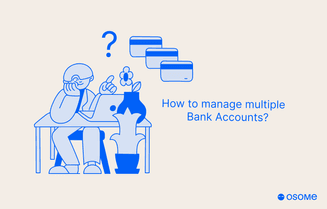How To Manage Multiple Bank Accounts: Top Strategies
- Published: 25 December 2024
- 10 min read
- Running a Business


Heather Cameron
Author
Heather is here to inform and inspire our readers. Boasting eight years in the world of digital marketing, working in diverse industries like finance and travel, she has experience writing for various audiences. As Osome’s resident copywriter, Heather crafts compelling content, including expert guides, helpful accounting tips, and insights into the latest fintech trends that will help entrepreneurs, founders and small business owners in Hong Kong take their businesses to the next level.
Wondering how to manage multiple bank accounts? This guide will walk you through practical tips to simplify your account management. You’ll discover methods to track your finances, set specific goals for each account, and automate transfers to stay organised and secure.
Key Takeaways
- Understand your goals to determine the appropriate number of bank accounts needed for effective cash flow management.
- Implement a centralised tracking system to monitor account balances and automate transfers to streamline finances and enhance accountability.
- Assign specific purposes to each account, regularly review your strategy, and take advantage of account benefits for optimised financial management.
1 Understand Your Financial Goals
Recognising your financial targets is the cornerstone of effective money management. Understanding what you want to achieve financially helps determine the appropriate number of bank accounts you need. Whether your goals include building an emergency fund, saving for a vacation, or investing in your future, knowing these targets will shape how you organise and manage your accounts.
Differentiating between short-term and long-term financial objectives is crucial. For instance, short-term goals might include accumulating enough savings for a new gadget or a vacation fund, while long-term goals could involve saving for retirement or purchasing a home. Clearly defining these objectives allows for more efficient fund allocation and ensures each account serves a distinct purpose.
Need help getting your business finances on track? Osome offers a comprehensive suite of services, including company registration, bank account opening assistance, and accounting solutions. We can streamline the process of setting up your business and ensure you have the financial foundation for success. Contact us today to learn more!
Directing a portion of your salary into emergency savings through automatic transfers significantly boosts overall savings growth and helps maintain consistency with your financial plan.
2 Create a Centralised Tracking System
A centralised tracking system is crucial for managing multiple bank accounts effectively. Consolidating account information provides a comprehensive financial overview, aiding in budgeting and spending decisions. Tools like spreadsheets, budgeting apps, and consolidated financial dashboards can help you efficiently track account balances and monthly fees.
Using a centralised system helps avoid overdrafts and low-balance penalties. A well-organised tracking system helps you manage multiple bank accounts and see all your transactions, including automated bill payments and direct deposits, in one place.
Implementing a central tracking system also enhances data quality and processing efficiency. This system provides clear audit trails and enhances accountability in managing your accounts, ensuring that your money is always organised and aligned with your goals.
3 Opening the Fundamental Accounts
You need at least one checking account for regular expenses like groceries, gas, and monthly bills. Your primary checking account is usually the account with the debit card you use for everyday spending. If you're an entrepreneur, you may want a separate checking account for your business endeavours.
Everyone should have at least one savings account dedicated to emergency savings, ensuring you are prepared for unexpected financial needs. Usually, a high-yield savings account would serve best as your emergency reservoir. Depending on your savings goals, other accounts may also come in handy. For example, a money market account benefits those sitting on a large cash stash at home.
You should also consider opening retirement accounts as early as possible to start saving for your future. Unlike traditional bank accounts, Roth IRA, IRA, or 401(k) accounts should not be withdrawn until retirement age and could serve as vital investment accounts to help multiply your wealth.
4 Assign Specific Purposes to Each Account
Giving specific purposes to each bank account streamlines finances and aids in tracking spending.
Separate bank accounts for different financial purposes simplify budget management. A spending account can be used for daily expenses, while a separate savings account can be designated for short-term goals such as a vacation or a new gadget. This clear distinction helps you stay on track with your financial objectives and avoid dipping into funds meant for other purposes. Additionally, having multiple savings accounts and separate checking accounts can further enhance your financial organisation.
Additionally, a spending reserve account can be beneficial for managing occasional expenses such as gifts or hobbies, while a rainy day fund is suitable for unexpected costs that aren’t true emergencies. Clearly defined account purposes lead to more efficient financial goal achievement and minimised impulsive spending.
Regularly reviewing and adjusting checking accounts according to evolving financial situations is crucial for those managing multiple accounts. This approach ensures that your accounts remain aligned with your goals and that you always make the most of your financial resources.
5 Implement Strong Security Measures
Securing financial accounts is paramount in the digital age. Unique passwords for each account help prevent unauthorised access. Create complex passwords by combining a random assortment of upper and lower-case letters, numbers, and symbols. This practice ensures that your accounts are less vulnerable to hacking attempts.
Enabling two-factor authentication adds an extra layer of security to your accounts. This method requires you to verify your identity through a second device or application, making it significantly harder for unauthorised users to gain access. Regularly updating your passwords further reduces the risk of breaches, keeping your financial information safe.
Biometric authentication, such as fingerprint or facial recognition, adds another layer of security to your accounts. Additionally, using a reputable password manager can help you securely manage your passwords, ensuring that they are stored safely and are easily accessible when needed. Implementing these security measures protects financial accounts from potential threats.
6 Automate Transfers and Payments
Automated transfers and payments significantly simplify managing multiple bank accounts, as many banks offer features for setting up automatic transfers tailored to financial needs. This automation ensures that your funds are allocated correctly, preventing impulsive spending by moving money out of sight before it can be spent. Additionally, it helps you manage multiple bank accounts effectively.
Automatic direct deposits to emergency funds ensure preparedness for unexpected expenses. Additionally, automated transfers can help implement a dollar-cost averaging strategy for investments, reducing overall risk and promoting consistent savings growth.

Enabling autopay for bills ensures timely payments and prevents missed payments. This feature is particularly useful for managing recurring expenses such as utilities, rent, and loan payments. Automating these processes allows you to focus on other financial management aspects, with the assurance that bills are paid on time and savings grow consistently.
7 Periodically Review and Rebalance Accounts
Regular assessments ensure bank accounts remain aligned with financial objectives. Revisiting your strategy at least annually helps you adapt to financial shifts. Changing financial priorities may affect how you manage multiple bank accounts. For example, you might want a joint checking account if you're in a serious relationship. You may also need multiple accounts for personal and business funds.
Closing unnecessary accounts prevents confusion and streamlines your financial tracking, reduces unnecessary monthly fees. When rebalancing your accounts, consider transferring money, opening new accounts, or closing old ones as needed.
Evaluating your income and expenses is crucial when devising an effective rebalancing strategy. Regularly reviewing these factors ensures that your accounts are optimised for your current financial situation.
8 Take Advantage of Account Benefits
Having multiple bank accounts can lead to higher interest rates, sign-up bonuses, and lower fees. Different banks may offer higher interest rates for different accounts as incentives. Therefore, opening multiple bank accounts can help you maximise account benefits such as cash-back bonuses and mileage points. Consider your goals and needs if you’re wondering how many bank accounts you should have.
To take advantage of these benefits, it’s important to understand the requirements for qualifying for account bonuses. Some banks may have a minimum balance requirement or minimum transaction counts. Utilising cash back or rewards programs can also enhance your financial benefits while using credit cards.
Strategic management of multiple bank accounts maximises benefits and improves financial situations. This approach saves more and offers perks like points and cash back, making your money work harder.
9 Utilise Digital Banking Tools
Digital banking enables financial management anytime and anywhere via online platforms and mobile apps. Common features of digital banking include online banking, mobile banking, and remote check deposits. These tools provide convenience and flexibility, making managing multiple accounts from the same bank.
Some online banks may come with fewer fees and sometimes higher savings interest than traditional bank accounts. Digital banking also enhances data quality and processing efficiency, ensuring your financial information is always up-to-date.
Using digital banking tools can significantly improve your financial management, providing clear audit trails and enhancing accountability. Additionally, enabling security alerts can notify you of suspicious account activity, helping you stay informed and proactive in managing your finances.
10 Consider Multi-Currency and International Accounts
Multi-currency and foreign currency accounts can hold, send, and receive money in different currencies. Before choosing a multi-currency account, compare features, fees, and exchange rates and only work with trustworthy financial institutions.
These bank accounts can benefit those paying bills internationally, such as those who frequently travel or conduct business internationally. They also provide financial stability and flexibility, making it easier to manage finances across different regions.
By keeping all your foreign currencies within one account, you can optimise your financial management and take advantage of global opportunities while paying fewer fees than you would if you had multiple bank accounts for each currency.

Multi-currency and international accounts enhance financial strategy, offering additional tools to manage your funds effectively. This approach ensures that you are prepared for any financial situation, whether it involves travel, business, or personal expenses.
11 Maintain a Good Credit Health
Good credit health is vital for your personal finances. To build a positive credit history, make timely payments on credit cards and be responsible when spending money to keep your credit utilisation ratio below 30%. Prioritise clearing unpaid negative balances and paying off accounts that are generating more interest.
Consistent and responsible credit management leads to better financial outcomes and the benefits of a strong credit profile. For example, paying more than the minimum requirement can reduce overall debt and interest accumulation. This approach contributes to your overall money management strategy, ensuring that you are always in control of your financial destiny.
Looking to establish your business and secure a business bank account? Osome offers seamless company registration services in Hong Kong, including assistance with opening a business bank account. We'll handle the legalities and ensure your business is set up for financial success. Don't hesitate to reach out for more information!
Summary
In summary, managing multiple bank accounts effectively requires a strategic approach and consistent effort. You can easily achieve your financial objectives by understanding your financial priorities and savings goals, creating a centralised tracking system, building your core bank accounts, assigning specific purposes to each account, and implementing strong security measures. Generally, having separate accounts for different purposes can help avoid overspending and streamline budgeting and planning.
Additionally, automating transfers and payments, periodically reviewing and rebalancing accounts, taking advantage of account benefits, utilising digital banking tools, considering multi-currency accounts, and maintaining good credit health are all essential strategies for optimising your financial management. Embrace these tips and watch your financial progress soar.






